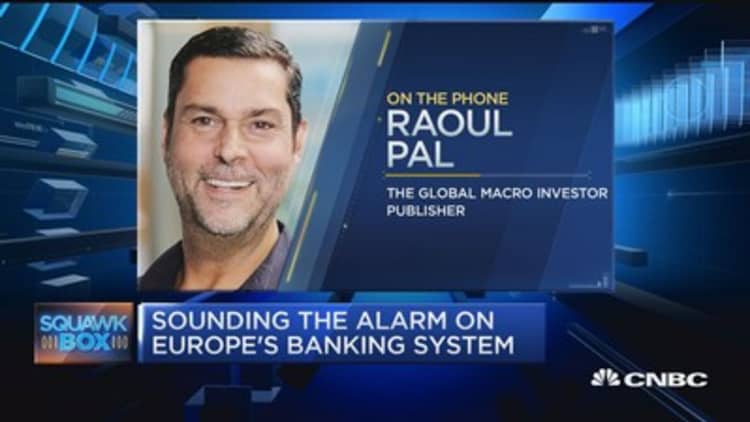At this point, the possibility of a massive U.S. Justice Department settlement should be the least of Deutsche Bank's worries, a former fund manager and current market newsletter publisher told CNBC on Monday.
The German banking giant has become "the epicenter of a storm," Raoul Pal, founder of The Global Macro Investor, told "Squawk Box." He said Deutsche Bank's falling share price, what he called its faulty business model, its large derivative book and Europe's negative rates all contribute to the current volatility.
According to Pal, the Justice Department's proposed fine is just one step in a much more arduous journey.
Though he does not believe Deutsche Bank will end up paying the full $14 billion the DOJ said it should, Pal estimates the payment will be slightly higher than what the market is hoping for — somewhere between $6 billion and $8 billion.
While Pal views the problem on a larger, more long-term scale, he acknowledged that Germany is in an especially difficult position with the Deutsche Bank situation.
Calling the issue a "political hot potato," Pal said Germany has set itself up so that taxpayers are protected from having to fund bailouts, enacting a bail-in mechanism that Deutsche Bank simply cannot handle.
In other words, Deutsche Bank is "too big to bail in," which leaves Chancellor Angela Merkel in a difficult place just months ahead of the country's 2017 election.
And with Europe heading toward a recession, Pal said that while Deutsche Bank will not be the direct cause of a potential crisis, it will likely be a catalyst.

While the world remains focused on resolving the issue of Deutsche Bank, Pal believes its effects have reverberated unnoticed through the rest of the European banking sector.
Not only has Pal, who lived in Spain for a decade, noticed smaller Spanish banks like Banco Popular in free fall with many hitting all-time lows, but bigger banks like Santander also reflect some of the very same problems currently plaguing Deutsche Bank.
"It's all from the same issues. Basically, a lot of the bad loans in Europe, whether it's Italy, whether it's Spain, didn't go away. There's the problem now of how banks fund themselves, and then there's the problem of the yield curve," he said.
"So the whole thing is grinding the whole sector slower over time," Pal argued.


